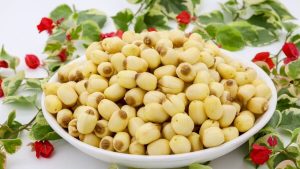
Lotus Seed is not only a symbol of purity and nobility in Vietnamese culture, but also a plant that brings immense economic value, especially from its seeds. Lotus seeds have become a precious ingredient in cuisine, medicine, and a potential export product for Vietnam.
1. The Lotus Plant and Its Artistic Value
The lotus plant () is an aquatic plant belonging to the family. The lotus is deeply intertwined with the image of Vietnamese villages, appearing in poetry, paintings, architecture, and traditional festivals. The beauty of the lotus is not only in its pink or pristine white petals, but also in its lush green leaves, elegant stems (lotus rhizomes), and especially the lotus pod with its round, plump seeds.
Ancient architectural structures like One Pillar Pagoda and decorative patterns on ceramics and bronze ware are all inspired by the lotus, showcasing sophistication, harmony, and spiritual depth. The lotus also symbolizes resilience and the ability to rise above adversity, “close to the mud but not tainted by its smell,” representing the good qualities of the Vietnamese people.

2. Main Growing Regions
Lotus is widely grown throughout Vietnam, especially in low-lying areas and ponds. Provinces with large lotus cultivation areas and high-quality lotus seed production include:
- Dong Thap: Known as the “lotus capital” of the Mekong Delta, Dong Thap has a large lotus growing area and a diverse range of lotus-based products.
- Long An: With many wetlands, Long An is also a developing lotus growing region.
- Hue: Hue’s Tinh Tam lotus is famous for its unique, delicate flavor.
- Hanoi: The lotus ponds in West Lake, Hanoi, are not only attractive tourist spots but also provide high-quality lotus seeds.
- Mekong Delta provinces: Besides Dong Thap and Long An, many other provinces in the region also cultivate lotus on a large scale.
3. Nutritional Value of Lotus Seeds
Lotus seeds are a highly nutritious “superfood,” offering numerous health benefits. 100g of dried lotus seeds contain approximately:
- Energy: Around 332 kcal.
- Carbohydrates: About 64.4 g (mainly starch).
- Protein: About 15.4 g.
- Dietary fiber: About 4.9 g.
- Vitamins: Rich in B vitamins (B1, B2, B3, B6) and folate.
- Minerals: Abundant in minerals such as manganese, magnesium, potassium, phosphorus, zinc, iron, and copper.
- Beneficial compounds: Contains many antioxidants, flavonoids, and alkaloids that help protect the body from cell damage.

Lotus seeds are known for their many uses, including:
- Sedative, sleep improvement: Compounds in lotus seeds help relax nerves, reduce stress, and aid in treating insomnia.
- Good for cardiovascular health: Lotus seeds help regulate blood pressure, reduce bad cholesterol, and protect cardiovascular health.
- Digestive support: High fiber content helps prevent constipation and improves bowel function.
- Anti-aging: Antioxidants help slow down the aging process, maintaining a youthful appearance.
- Boosts bone health: Thanks to their rich magnesium and phosphorus content.
4. Products from Lotus Seeds
From fresh to dried, lotus seeds have been processed into a variety of products, serving different consumer needs:
- Fresh/dried lotus seeds: Used in sweet soups (), porridges, stews, and candied treats (). Dried lotus seeds are commonly used year-round.
- Lotus seed powder: Used for beverages, baking, or as an ingredient for nutritional products.
- Lotus seed milk: A delicious and nutritious drink, especially beneficial for vegetarians or those looking to supplement their plant-based diet.
- Candied lotus seeds (): A traditional treat during Tet (Lunar New Year), offering a distinctive sweet and nutty flavor.
- Dried lotus seeds: A convenient ready-to-eat snack that retains the natural flavor and nutritional value of lotus seeds.
- Canned lotus seeds: Convenient for storage and use, often used in sweet soups or porridges.
- Lotus plumule tea: The green germ inside the lotus seed (lotus plumule) is dried and used to brew tea, which has calming and cooling effects.
5. Lotus Seed Export Market
Vietnamese lotus seeds are increasingly asserting their position in the international market due to their good quality and high nutritional value. Lotus seed products from Vietnam have been and are being exported to many countries, mainly focusing on the following markets:
- China: A traditional and largest export market for Vietnamese lotus seeds, especially dried lotus seeds.
- South Korea, Japan: The demand for natural and healthy products in these markets is growing, creating opportunities for Vietnamese lotus seeds.
- USA, Europe: These demanding markets require products to meet strict food safety and hygiene standards, but the export potential is significant for processed lotus seed products.
- Southeast Asian countries: Singapore and Malaysia are also potential markets with demand for traditional and healthy foods.
To further boost the export market, Vietnamese businesses need to focus on:
- Improving product quality: Ensuring food safety and hygiene, complying with international standards (GlobalGAP, HACCP, ISO).
- Diversifying processed products: Developing convenient, high value-added products such as lotus seed milk, ready-to-eat dried lotus seed, and confectionery from lotus seed.
- Building brands: Promoting the image of Vietnamese lotus seed to the world.
- Investing in processing technology: Applying modern technology to improve productivity, quality, and product shelf life.
Other articles:
Other agricultural products:


